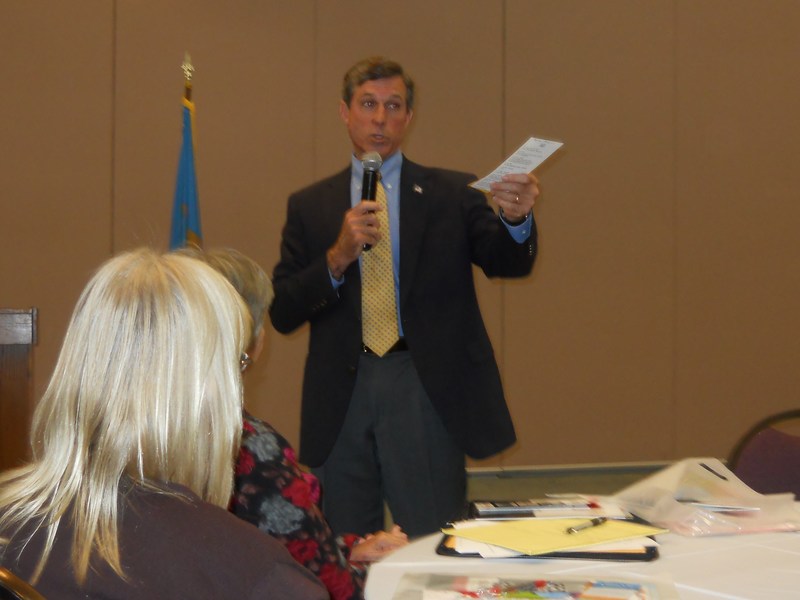On a statewide blitz of town hall meetings to raise awareness and educate citizens on the dangers of fraud and identity theft, U.S. Rep. John Carney recently stopped at the CHEER Community Center in Georgetown with an expert from the Federal Trade Commission to address perhaps the most vulnerable population for scammers: senior citizens.
Derick Rill, a congressional liaison from the Federal Trade Commission, offered tips, often in the form of a rap, such as "If you want real love, go to a .gov," to guide seniors toward government websites as reputable sources.
As one of his most basic tips, Rill guided the group of nearly 60 people to always look for two trusted sources before making any financial decisions; ideally those sources would have no stake in the company of money involved.
"Two trusted sources," he said, holding up his index and middle fingers in a peace sign, "is peace of mind."
Identity theft was also a hot topic at the town hall, as Carney disclosed his own run-ins, Rill reminded the group of how often identity theft actually occurs.
"The top complaint we get at the FTC is about instances of identity theft," he said. "There are 10 million victims each year. Scammers are opening up credit cards, loans, filing federal income tax. Identity theft happens when you are giving up your social security number."
Rill also reminded seniors of the three credit reporting agencies and official, free government website, annualcreditreport.com, that enables citizens to check their credit report each year.
He also advised seniors against deceptive phone calls requesting wire transfers, mail-order scams and encouraged a proactive approach to banking.
“You should develop a relationship with your bank,” Rill said. “You should know their names, and they should know yours. Another trusted source. Create a trusted source.”
Arlene Littleton, executive director of CHEER, said she thought this was an important town hall discussion to hold at the community center.
“It is very timely that we are having this event today. We have so many more elderly here, and there are so many more sophisticated scams,” Littleton said. Elderly people tend to be so trusting they are easy targets for scammers, she said.
Rep. Carney said seniors contact federal offices with their complaints and any encounters with fraud to help better understand and combat the problem.
"My biggest takeaway from this is we need to do more of these to protect our seniors," Carney said. "This is an area where we need to hear from you so we can advocate on your behalf. We don't have that information unless we hear from you."
10 ways to avoid fraud:
The Federal Trade Commission offers the following tips to avoid fraud
1. Keep in mind wiring money is like sending cash: once it’s gone, you can’t get it back.
2. Don’t send money to someone you don’t know.
3. Don’t respond to messages that ask for personal or financial information, whether an email, phone call, text message or ad.
4. Don’t play a foreign lottery.
5. Don’t agree to deposit a check from someone you don’t know, then wire money back, no matter how convincing the story.
6. Read your bills and monthly statements regularly, on paper and online.
7. In the wake of a natural disaster or another crisis, give to established charities rather than one that seems to have sprung up overnight.
8. Talk to your doctor before buying health products or signing up for medical treatments.
9. Remember there’s no such thing as a sure thing.
10. Know where an offer comes from and who you are dealing with.

















































